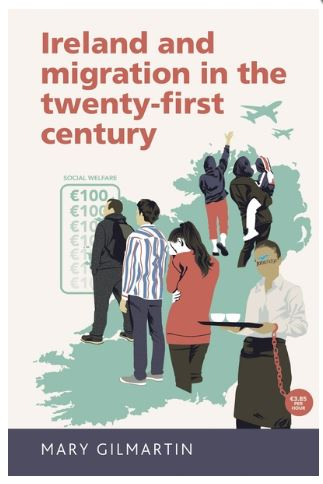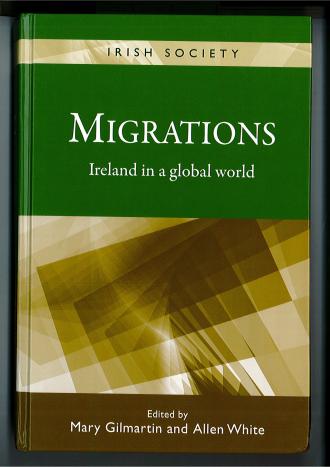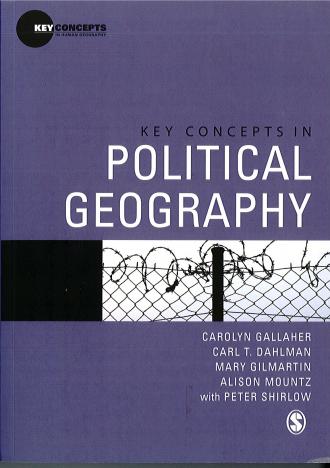Mary Gilmartin
Gilmartin, M, Wood, P, O'Callaghan C, (2018) Borders, Mobility and Belonging in the Era of Brexit and Trump Bristol: Policy Press. 120pp

Questions of migration and citizenship are at the heart of global political debate with Brexit and the election of Donald Trump having ripple effects around the world.
Providing new insights into the politics of migration and citizenship in the UK and the US, this book challenges the increasingly prevalent view of migration and migrants as threats and of formal citizenship as a necessary marker of belonging. Instead the authors offer an analysis of migration and citizenship in practice, as a counterpoint to simplistic discourses.
The book uses cutting-edge academic work on migration and citizenship to address three themes central to current debates – borders and walls, mobility and travel, and belonging. Through this analysis a clearer picture of the roots of these politics emerges as well as of the consequences for mobility, political participation and belonging in the 21st century.
Gilmartin, M, (2015) Ireland and Migration in the Twenty-first Century. Manchester: Manchester University Press. 208pp

Migration is one of the key issues in Ireland today. This book provides a new and original approach to understanding contemporary Irish migration and immigration, showing that they are processes that need to be understood together rather than separately. It uses a wide range of data - from statistical reports to in-depth qualitative studies - to show these connections. The book focuses on four key themes - work, social connections, culture and belonging - that are common to the experiences of immigrants, emigrants and internal migrants. It includes a wide selection of case studies, such as the global GAA, the campaign for emigrant voting, and the effects of migration on families. Clearly written and accessible, this book is an invaluable resource for students and scholars of Irish migration. It also has broader relevance, as it suggests a new approach to the study of migration nationally and internationally.
Gilmartin M, White A (eds) (2013) Migrations: Ireland in a Global World. Manchester: Manchester University Press. 256pp

This edited collection explores Ireland’s complex relationship with migration in novel and innovative ways. The contributors – leading scholars of migration from the disciplines of anthropology, geography, history, media studies, sociology, sociolinguistics and women’s studies – draw on new research to provide insights into emigration from and immigration to Ireland, both past and present. The chapters, which range from the nineteenth to the twenty-first century, cover topics as diverse as migrant women and children in Ireland, the role of the Irish Catholic in migration networks, and recent Irish migration to Australia. They are organised around three cross-cutting themes: networks, belonging and intersections. They focus on the migratory process rather than on migration as a uni-directional movement of people. Though centred on Ireland, the collection has broader implications for the ways in which migration is conceptualised. The collection will appeal to scholars of migration and Irish studies, and to readers with backgrounds in a range of social science and humanities disciplines, including geography and sociology.
=====
Gallaher C, Dahlman C, Gilmartin M, Mountz A, Shirlow P (2009) Key Concepts in Political Geography. London: Sage Publications. 392pp.

Key Concepts in Political Geography is a new kind of textbook that forms part of an innovative set of companion texts for the Human Geography sub disciplines. Organized around 20 short essays, Key Concepts in Political Geography provides a cutting edge introduction to the central concepts that define contemporary research in political geography. Involving detailed and expansive discussions, the book includes: An introductory chapter providing a succinct overview of the recent developments in the field; Over 20 key concept entries with comprehensive explanations, definitions and evolutions of the subject; Extensive pedagogic features that enhance understanding including a glossary, figures, diagrams and further reading. Key Concepts in Political Geography is an ideal companion text for upper-level undergraduate and graduate students in political geography and covers the expected staples of the sub-discipline, such as nationalism, territoriality, scale, and political-economy, as well as relatively new arrivals to the field, including the other, anti-statism, gender, and post-conflict. Written by an internationally recognized set of authors, Key Concepts in Political Geography is an essential addition to any geography student’s library.
=====
